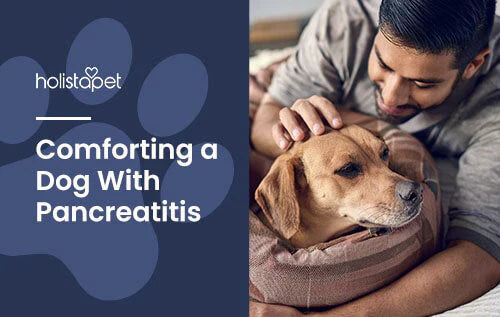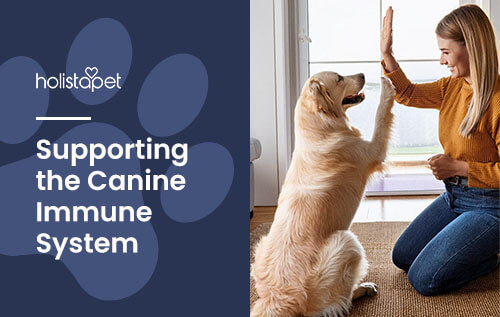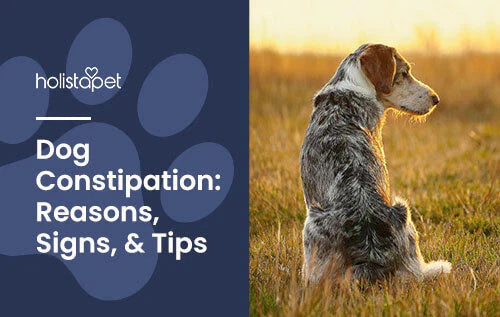Dealing with a canine companion suffering from pancreatitis isn't easy, but learning how to comfort a dog with pancreatitis can make things easier. It's not just about waiting it out; you have the power to help your furry friend get through the tough days.
Early intervention methods like tweaking your dog's diet and using relief aids may help ease your dog's discomfort. In this guide, we're cutting straight to the chase with strategies that work so you can bring your furry friend real relief when they need it most.
Understanding Canine Pancreatitis: Symptoms and Causes
Pancreatitis in dogs refers to the irritation of the pancreas. This organ sits near the small intestine and produces pancreatic enzymes for digestion. When things go wrong, those enzymes can leak into the bloodstream and wreak havoc. If left unchecked, dog pancreatitis can snowball into a life-threatening ordeal.
There are two main types of pancreatitis in dogs: acute and chronic. Acute pancreatitis involves a sudden onset of symptoms, while chronic pancreatitis is more of a long-term issue. Both can cause serious discomfort. Common symptoms include:
- Frequent Vomiting. Your dog may throw up several times, especially after meals.
- Abdominal Discomfort. They might hunch over because of discomfort.
- Lack of Appetite. They might lose interest in food.
- Lethargy. A sluggish dog could be dealing with severe pancreatitis.
- Diarrhea. Loose stools can signal trouble with their digestive enzymes.
What's behind dogs' pancreatitis? The most common causes include:
- High-Fat Diet. Fatty foods can overload your dog's system and cause irritation.
- Table Scraps. Giving in to those puppy eyes could lead to a pancreatitis attack.
- Certain Medications. Some meds can mess with the pancreas and cause irritation.
- Genetics. Breeds like cocker spaniels and miniature schnauzers are at a higher risk of developing pancreatitis.
Whisk your dog away to the vet as soon as you notice these symptoms. They can conduct blood tests, abdominal ultrasounds, and other examinations to accurately diagnose pancreatitis and suggest treatment options.
Why Comfort Is Crucial for Dogs With Pancreatitis

Comfort isn't a luxury but a necessity for dogs with pancreatitis. The intense discomfort can make recovery an uphill battle. Keeping your pup comfortable can help soothe their aches and support faster healing.
Comfort can also keep complications at bay. Ill dogs often lose their appetite, which can mess with their blood sugar levels and throw off their digestion even more. Easing their discomfort can help keep their system balanced. Plus, let's be real; your furry buddy's emotional well-being matters just as much!
Immediate Steps To Take When Your Dog Is Diagnosed With Pancreatitis
When your dog gets diagnosed with pancreatitis, you have to act fast. The quicker you move, the better their chances of recovery. Here are some tips:
- Manage Their Discomfort. Administer any medications your vet might prescribe to help ease your dog's symptoms.
- Switch to a Low-Fat Diet. Move your dog to a low-fat meal plan immediately to help reduce irritation in their pancreas.
- Provide Small, Frequent Meals. Serve smaller meals throughout the day to keep their digestive system steady.
Dietary Changes To Help Dogs With Pancreatitis
Making targeted adjustments to your dog's diet can help ease discomfort and prevent future flare-ups. The goal? Low-fat nutrition that can give your dog's pancreas a break. As mentioned, fatty food is bad news, so steer clear of any high-fat pet food, treats, or table scraps.
You'll also want to serve smaller, more frequent meals throughout the day. This can help keep your pup's digestive system stable during recovery.
Low-Fat Diet Options
Keeping your canine friend's meals light but nutritious can make all the difference. Luckily, there are simple options to keep their nutrition on track:
- Lean Proteins. Serve cooked chicken breast or turkey for a healthy protein source.
- Specialized Low-Fat Dog Food. Pick specially formulated dog food to support your pet's needs.
- Vegetables. Carrots and green beans can serve as great low-fat snacks.
Hydration and Its Role in Recovery
Hydration is the unsung hero during recovery. Keeping that water bowl full is a simple step that can go a long way. Here's why hydration matters:
- Prevents Dehydration. Vomiting and diarrhea, common symptoms of pancreatitis, can quickly dehydrate your dog, so keep water within reach.
- Flushes Out Toxins. Water helps remove harmful toxins, promoting faster recovery.
- Supports Digestion. Proper hydration helps keep digestion on track, easing tummy discomfort.
- Promotes Recovery. Staying hydrated helps your dog's body function properly, speeding their return to normal.
How to Comfort a Dog With Pancreatitis at Home
Simple, thoughtful actions can help soothe your aching pup. Here's how you can try to help:
- Create a Calm Environment. Minimize noise and stress around the house to help your dog relax.
- Provide Soft Bedding. A cozy, supportive bed can help reduce strain on their stomach and joints.
- Offer Gentle Massages. Softly rubbing their back or sides can help bring relief and reduce tension.
- Stick to Small, Consistent Meals. Regular meals that are easy to digest can help prevent further irritation.
- Monitor Their Symptoms. Keep a close eye on your dog's symptoms and ensure they aren't worsening.
- Avoid Vigorous Activity During Recovery. Avoid vigorous activity until recovery to prevent putting additional strain on your dog's body, which is already working to heal. Gentle rest allows the pancreas to recover without added stress from physical exertion.
Creating a Calm Environment
Creating a peaceful space for your canine companion doesn't just ease their body but their mind, too. Start by keeping things quiet and mellow. Avoid anything that might jolt or stress them out.
If your home's got a lot of hustle and bustle, pick out a quiet corner just for your dog. Make sure it's stocked with soft bedding, toys, and plenty of space for resting.
Gentle Physical Comfort Measures
When your dog is feeling rough, gentle physical comfort can work wonders. Keep your touches soft and soothing to help your dog feel better without worsening the situation.
Start with a gentle massage. Lightly rub their back or sides to help ease muscle tension. Avoid any rough handling or sudden movements. Instead, focus on creating a sense of calm with your gentle touches.
Can CBD Offer Comfort to Dogs With Pancreatitis?

CBD has been making waves as a natural way to help soothe pets, but can it help comfort dogs with pancreatitis? The short answer: absolutely. CBD may offer gentle relief during uncomfortable and stressful moments.
CBD interacts with your dog's endocannabinoid system (ECS), which plays a role in regulating discomfort, mood, and irritation. While it's not a cure, CBD can make a big difference in how your dog feels day to day.
The Benefits of CBD for Physical Discomfort
CBD has become a popular choice for helping manage physical discomfort in dogs. This natural remedy offers a range of potential benefits that may help ease your pet's struggles:
- Supports Relaxation. CBD's relaxing properties can help soothe your dog during rough patches.
- Eases Aches and Soreness. It may help reduce muscle aches and body soreness by interacting with the nervous system.
- Promotes Better Rest. CBD's soothing effects can help pets rest, essential for recovery.
- Helps With Digestion. It may support digestion, giving their digestive system a much-needed break.
Is CBD Safe for Dogs With Pancreatitis?
The short answer is yes. CBD is generally safe for dogs with pancreatitis—as long as it's high-quality and properly dosed. When used correctly, CBD is well-tolerated by most pups.
Always consult your vet before using CBD, especially if your furry pal is on medication. Quality matters, too! Ensure you choose a trusted source (like HolistaPet) that uses third-party testing to ensure safety and efficacy.
What Edible CBD Options Do We Offer for Dogs?
HolistaPet offers several CBD options to support dogs, especially during challenging times like dealing with physical discomfort and stress. Our products can deliver natural relief in tasty, easy-to-administer forms. We use only premium, broad-spectrum CBD that contains no THC (tetrahydrocannabinol), the mind-altering compound in cannabis.
CBD Treats
HolistaPet offers two fantastic CBD treat options. Depending on your dog's preference, you can choose from our:
- Crunchy Treats. Our CBD Hard Treats for Dogs feature a tasty peanut butter flavor and combine CBD with other calming ingredients like L-theanine and chamomile.
- Soft Chews. Our Calming CBD Chews for Dogs also has a yummy peanut butter flavor, plus soothing ingredients like tryptophan and chamomile.
CBD Oil
Our CBD Oil for Dogs combines broad-spectrum CBD with hemp seed oil for holistic support. It's in a convenient dropper bottle to help with precise dosing.
CBD Capsules
Our CBD Capsules for Dogs let you confidently choose the ideal strength from our range of sizes. The capsule is easy to hide in a treat, or you can open it and mix it into your dog's food or water.
Signs Your Dog Is in Discomfort From Pancreatitis
Dogs can be masters at hiding their pain, but there are a few telltale signs they're uncomfortable. Watch for the following:
- Restlessness. Your dog might keep shifting or have difficulty settling down.
- Whining or Whimpering. They may vocalize more than usual.
- Hunched Posture. They might arch their back or walk with a stiff, protective stance.
- Licking or Biting at Their Belly. Dogs often lick or nibble at painful areas.
- Panting. Panting heavily without being physically active can mean discomfort.
Managing Pain and Discomfort in Dogs With Pancreatitis
Take swift, thoughtful actions to help manage your furry buddy's discomfort from canine pancreatitis. Here are a few ways to help:
- Pain Medication. Your vet might prescribe specific medication to help ease your dog's troubles.
- Anti-Nausea Medication. This can help reduce vomiting and help settle their stomach.
- Comfort Measures. Ensure they have a cozy spot to rest, provide gentle massages, and offer consistent, small meals to avoid straining their digestive system.
How To Avoid Stress and Agitation in Dogs With Pancreatitis
Stress can crank up your dog's discomfort, so keeping them chill is a top priority. Here's what you can do:
- Stick to a Routine. Keep a consistent schedule to help your pup feel secure.
- Set Up a Quiet Zone. Create a peaceful spot where your dog can escape the noise and chaos.
- Handle Carefully. Give your dog some space when needed. Too much attention may add to their stress.
When To Consult Your Vet for Additional Support
Even with the best home care, there are times when expert help is a must. If your dog's condition isn't improving or worsens, visit your vet, stat.
Worsening symptoms like increased vomiting, severe abdominal pain, or lethargy call for a consultation. Also, if your dog refuses food or water, it could lead to dehydration, which needs quick attention. An emergency vet visit is a must in more serious cases, like difficulty breathing or collapse.
Final Thoughts: Comforting Dogs With Pancreatitis
Caring for a dog with pancreatitis isn't easy, but your support can be a game-changer in their recovery. Focus on their comfort and nutrition to pave the way for a smoother, faster healing process.
Our CBD dog products can be the extra boost they need, bringing relief when things get tough. Remember, your pup is resilient, and with your help, they'll be ready to take on anything.







![Probiotics For Dogs [Soft Chews] - HolistaPet](http://www.holistapet.com/cdn/shop/files/Probiotic-Infographic-1_472d7a29-e30c-435a-9638-1365d8c3a9f9.jpg?v=1725384841&width=104)



























Leave a comment
All comments are moderated before being published.
This site is protected by hCaptcha and the hCaptcha Privacy Policy and Terms of Service apply.